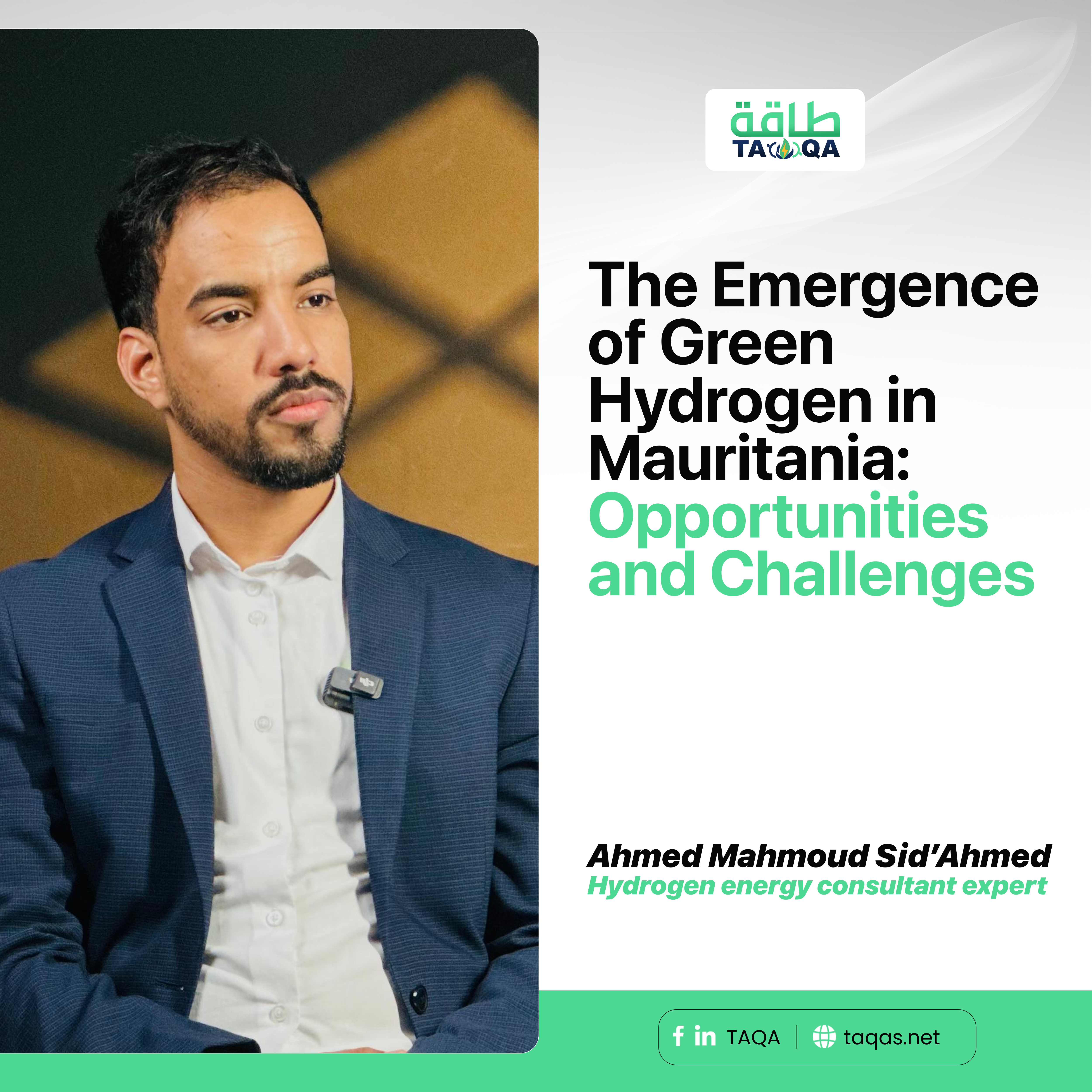The Emergence of Green Hydrogen in Mauritania: Opportunities and Challenges

Mauritania, with its abundant natural resources and strategic location, has significant potential to become a key player in the green hydrogen sector. The global transition to cleaner energy sources to combat climate change positions green hydrogen—produced using renewable energy—as a highly promising solution. This article delves into the economic and environmental potentials of green hydrogen production in Mauritania, along with the challenges that must be addressed to establish the country as a major player in this emerging industry.
Mauritania’s economic landscape stands to gain significantly from the development of a green hydrogen industry. The country is rich in renewable energy resources, particularly wind and solar power, which are essential for green hydrogen production. Utilizing these resources can lead to substantial economic benefits. Diversification of the economy is one such benefit. Historically reliant on mining and fishing, Mauritania can broaden its economic base through green hydrogen production, reducing its exposure to market volatility in these traditional sectors. This diversification can also buffer the economy against global commodity price fluctuations, providing a more stable economic foundation.
The establishment of green hydrogen projects can generate a wide range of employment opportunities. From construction and engineering to research and development, the green hydrogen sector can create jobs at various skill levels, positively impacting the local job market. These new job opportunities can stimulate economic growth, reduce unemployment rates, and improve living standards. Additionally, attracting investment is a critical economic advantage. The global movement towards sustainable energy is drawing significant investment. By positioning itself as a hub for green hydrogen, Mauritania can attract foreign direct investment, which will spur economic growth and infrastructure development. Such investments can also lead to technology transfer and capacity building, further enhancing the country’s economic prospects.
Mauritania has the potential to become a major exporter of green hydrogen as global demand for this clean energy source rises. Exporting green hydrogen can improve the country’s trade balance, provide a steady stream of revenue, and strengthen its economic position on the global stage. This export potential can also foster international partnerships and collaborations, opening up new markets and opportunities for Mauritanian businesses.
The environmental benefits of green hydrogen production in Mauritania are equally compelling. Green hydrogen is produced through the electrolysis of water using renewable energy sources, resulting in zero carbon emissions. This process aligns perfectly with global climate goals and offers several environmental advantages. One significant advantage is the reduction of the carbon footprint. By transitioning to green hydrogen, Mauritania can significantly lower its greenhouse gas emissions, making a substantial contribution to global efforts to mitigate climate change. This reduction in emissions can also improve air quality and public health within the country.
Using renewable resources for hydrogen production ensures a sustainable and inexhaustible energy supply, reducing dependence on fossil fuels. This sustainable energy supply can enhance energy security, stabilize energy costs, and protect the environment. Unlike traditional energy projects, renewable energy installations for green hydrogen production, such as solar panels and wind turbines, have a lower environmental impact. These installations can be integrated into the landscape with minimal disruption, preserving natural habitats and biodiversity. Moreover, green hydrogen can help reduce the environmental degradation associated with fossil fuel extraction and use.
However, several challenges need to be addressed for Mauritania to fully realize its green hydrogen potential. Infrastructure development is one of the foremost challenges. The production and export of green hydrogen require substantial investments in infrastructure, including electrolyzers, storage facilities, and transport networks. Developing this infrastructure will be both capital-intensive and time-consuming, requiring coordinated efforts from the government, private sector, and international partners. Building local expertise is another crucial challenge. Green hydrogen technology is still evolving, and there is a need for specialized knowledge and skills. Implementing education and training programs to build this expertise will be essential for the sustainable development of the industry.
Establishing a robust regulatory framework is essential to attract investment and ensure the sustainable development of the green hydrogen sector. Mauritania will need to develop clear policies and regulations to support the industry. This regulatory framework should address issues such as safety standards, environmental protection, and market incentives. Mobilizing financial investment is another significant challenge. Kickstarting green hydrogen projects will require significant financial resources. To mobilize these resources, Mauritania will need to attract funding from international investors, development banks, and public-private partnerships. Developing innovative financing mechanisms and providing investment incentives can also play a crucial role in attracting the necessary capital.
Market development is critical for the success of the green hydrogen sector. Creating demand, establishing supply chains, and fostering collaborations with other countries and companies engaged in the hydrogen economy are essential steps. Developing a market for green hydrogen both domestically and internationally will ensure the sustainability and growth of the industry. Engaging with stakeholders, including policymakers, industry leaders, and civil society, will be crucial in building a supportive ecosystem for green hydrogen.
The emergence of green hydrogen presents Mauritania with a unique opportunity to transform its energy landscape and achieve sustainable economic growth. Addressing the infrastructural, technical, regulatory, and financial challenges will be essential for the country to harness the full potential of green hydrogen. The potential benefits—economic diversification, job creation, environmental sustainability, and global leadership in renewable energy—make it a worthwhile endeavor. By focusing on these key areas, Mauritania can position itself at the forefront of the green hydrogen revolution, contributing to a cleaner and more sustainable future while driving economic development and improving the quality of life for its citizens.